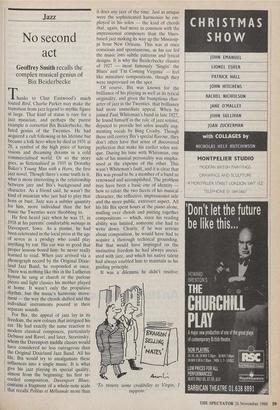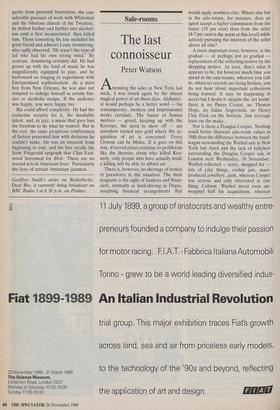Jazz
No second act
Geoffrey Smith recalls the complex musical genius of Bix Beiderbecke Thanks to Clint Eastwood's much touted Bird, Charlie Parker may make the transition from jazz legend to mythic figure at large. That kind of status is rare for a jazz musician, and perhaps the purest example is cornettist Bix Beiderbecke, the fated genius of the Twenties. He had acquired a cult following in his lifetime but became a folk hero when he died in 1931 at 28, a symbol of the high price of having visions and dreaming dreams in a cold commercialised world. Or so the story goes, as fictionalised in 1935 in Dorothy Baker's Young Man with a Horn, the first jazz novel. Though there's some truth in it, what is more interesting is the relationship between jazz and Bix's background and character. As a friend said, he wasn't the kind of musician who just had to play that horn or bust. Jazz was a subtler quantity for him, more individual than the hot music the Twenties were throbbing to.
He first heard jazz when he was 15, in 1918 at his parents' comfortable ménage in Davenport, Iowa. As a pianist, he had been celebrated in the local press at the age of seven as a prodigy who could play anything by ear. His ear was so good that proper lessons bored him; he never really learned to read. When jazz arrived via a phonograph record by the Original Dixie- land Jazz Band, he responded at once. There was nothing like this in the Lutheran hymns he sang at church or the parlour pieces and light classics his mother played at home. It wasn't only the propulsive rhythm, but the music's harmonic move- ment — the way the chords shifted and the individual instruments poured in their separate sounds.
For Bix, the appeal of jazz lay in its freedom, the new colours that intrigued his ear. He had exactly the same reaction to modern classical composers, particularly Debussy and Ravel, and later, Stravinsky, whom the Davenport middle classes would have considered no less outrageous than the Original Dixieland Jazz Band. All his life, Bix would try to amalgamate these influences into a single music. It is what give his jazz playing its special quality, almost from the beginning: his first re- corded composition, Davenport Blues, Contains a fragment of a whole-note scale that recalls Pelleas et Melisande more than
it does any jazz of the time. Just as unique were the sophisticated harmonies he em- ployed in his solos — the kind of chords that, again, had more in common with the impressionist composers than the blues- based jazz making its way up the Mississip- pi from New Orleans. This was at once conscious and spontaneous, as his ear led the music into subtle patterns and lyrical designs. It is why the Beiderbecke classics of 1927 — most famously `Singin' the Blues' and 'I'm Coming Virginia' — feel like miniature compositions, though they were improvised on the spot.
Of course, Bix was known for the brilliance of his playing as well as its lyrical originality, and given the bumptious char- acter of jazz in the Twenties, that brilliance had more immediate appeal. When he joined Paul Whiteman's band in late 1927, he found himself in the role of jazz soloist, deputed to provide hot solos usually aug- menting vocals by Bing Crosby. Though these still convey Bix's special flavour, they don't often have that sense of discovered perfection that make his earlier solos uni- que. During his time with Whiteman, one side of his musical personality was empha- sised at the expense of the other. This wasn't Whiteman's fault, and it is clear that Bix was proud to be a member of a band so renowned and accomplished. The problem may have been a basic one of identity how to relate the two facets of his musical character, the reflective, impressionist side and the more public, extrovert aspect. All his life Bix spent hours at the piano alone, mulling over chords and putting together compositions — which, since his reading ability was limited, someone else had to write down. Clearly, if he was serious about composition, he would have had to acquire a thorough technical grounding. But that would have impinged on the instinctive freedom he had always associ- ated with jazz, and which his native talent had always enabled him to maintain as his guiding principle. It was a dilemma he didn't resolve: `To restore some credibility to Virgin, 1 suppose.' partly from personal frustration, the con- siderable pressure of work with Whiteman and the bibulous climate of the Twenties, he drifted further and further into alcohol- ism until it first incapacitated, then killed him. Those lamenting his loss included his great friend and admirer Louis Armstrong, who sadly observed, 'He wasn't the type of lad who had his own strong mind.' By contrast, Armstrong certainly did. He had grown up with the kind of music he was magnificently equipped to play, and he harboured no longing to experiment with Europeanised sophistication. As a poor boy from New Orleans, he was also not tempted to indulge himself in artistic fan- cies or alcoholic escape. If the audience was happy, you were happy too.
Bix could afford complexity. He had the economic security for it, the insatiable talent, and, in jazz, a music that gave him the freedom to do what he wanted. But in the end, the same propitious combination of factors presented him with decisions he couldn't make. He was an innocent from beginning to end, and his fate recalls the Scott Fitzgerald epigraph that Clint East- wood borrowed for Bird: 'There are no second acts in American lives.' Particularly the lives of certain American jazzmen.
Geoffrey Smith's series on Beiderbecke, Dear Bix, is currently being brdadcast on BBC Radio 3 at 6.30 p.m. on Fridays.











































































 Previous page
Previous page